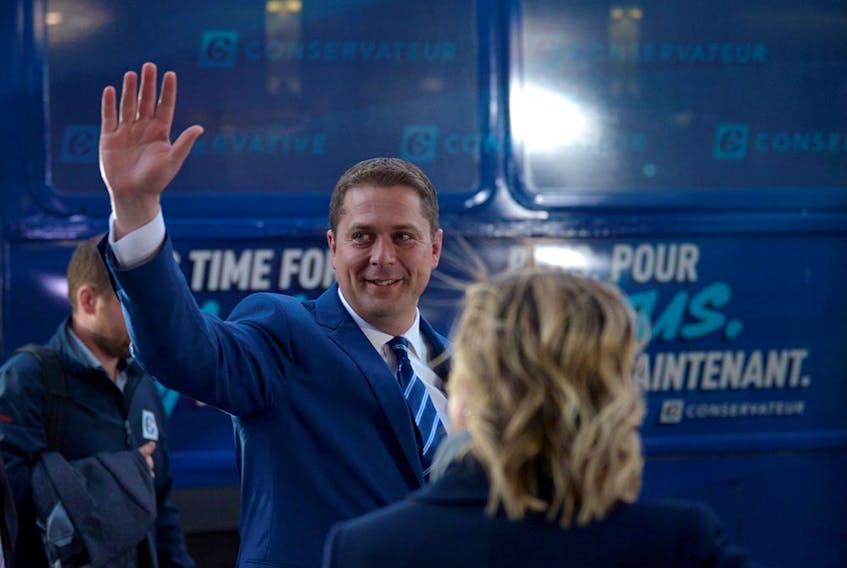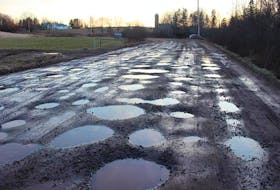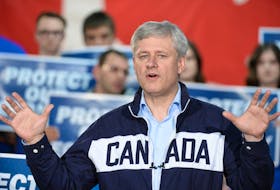Just about the last thing a leader wants to hear in the midst of an election campaign is speculation about his successor.
Andrew Scheer got a taste of it last week when a story surfaced about some disgruntled Conservatives pondering a post-election putsch to depose him and install former Central Nova MP and Harper-government cabinet minister Peter MacKay at the party’s helm. The scheme, obviously, is predicated on a Conservative loss.
For his part MacKay, now a Toronto-based lawyer, said all the right things about doing everything he can to help Scheer and denied that he’s even toying with the idea of taking the guy’s job.
The plausibility of the story is found not in MacKay’s future aspirations, but in Scheer’s future. Since the election call, if they’ve moved at all, the Conservatives have moved backwards. Canadians just aren’t warming to their leader.
The Conservatives went into the campaign aware that Scheer wasn’t well known but confident, or at least hopeful, that as Canadians came to know him both his popularity and that of his party would grow. Neither has happened.
In fact, Abacus Data’s latest numbers – from polling Oct. 8-10 – have about 30 per cent of Canadians with a favourable impression of Scheer, compared to 47 per cent who have a negative impression of the Conservative leader. Since the Sept. 11 election call, Scheer’s positive rating has slipped about five points, while his negatives increased almost 10. Among party leaders, the campaign has taken the biggest toll on Scheer’s popularity.
If the misery of political unpopularity loves company, Scheer has some in Justin Trudeau whose numbers are no better. But Trudeau went into the campaign underwater and his net-negative approval rating has hardly moved.
Ironically, or perhaps perversely, even as the Conservatives lost a little ground in recent weeks, their prospects of winning the most seats on Oct. 21 improved.
That’s because the NDP has captured some lightning in a bottle, and the New Democrats' surge comes at the expense of the Liberals whose projected seat count drops with each up-tick in NDP support.
NDP leader Jagmeet Singh’s popularity took flight over the past few weeks, and it’s finally lifting his party’s prospects, particularly in Ontario and British Columbia where NDP gains mean Liberal losses.
Compounding the Liberals’ problems is the rise of the Bloc Québécois, who are now looking to win 30 or more seats in Quebec, denying the Liberals the major gains they were anticipating in that province.
With the campaign down to its final few days, the Liberals and Conservatives remain deadlocked in popular support, and it’s a toss-up as to which party will win the most seats.
The Liberals are now banking on voters, worried about the prospects of a Conservative government, abandoning the NDP, the Greens and even the Bloc in the final week and voting Liberal to head off that outcome.
The Conservatives, meanwhile, are shoring up their base and hoping the NDP momentum continues to draw votes from the Liberals in sufficient numbers to deliver a plurality of Conservative seats.
Scheer’s future as leader of the Conservative Party still hangs on the outcome of the election, but it appears a little more secure, at least over the near term, than it was even last week when the MacKay story broke.
The national political landscape is decidedly uneven, unstable and unpredictable. A minority government is more likely than not and in that environment even Conservatives who are deeply disappointed by Scheer’s campaign performance would have to think twice before triggering a leadership contest.
Peter MacKay may still harbour ambitions to lead the party he and Stephen Harper created in 2003. MacKay led the federal Progressive Conservatives and Harper the Canadian Alliance when the two decided to unite the right and form the Conservative Party of Canada.
Harper, of course, emerged as leader and spent almost a decade in the Prime Minister’s office.
MacKay can be excused for thinking he deserves the same chance but, like the rest of us, he’ll have to wait for the dust to settle after next week’s vote to see what possibilities or perils the electorate delivers.
Journalist and writer Jim Vibert has worked as communications advisor to five Nova Scotia governments.









